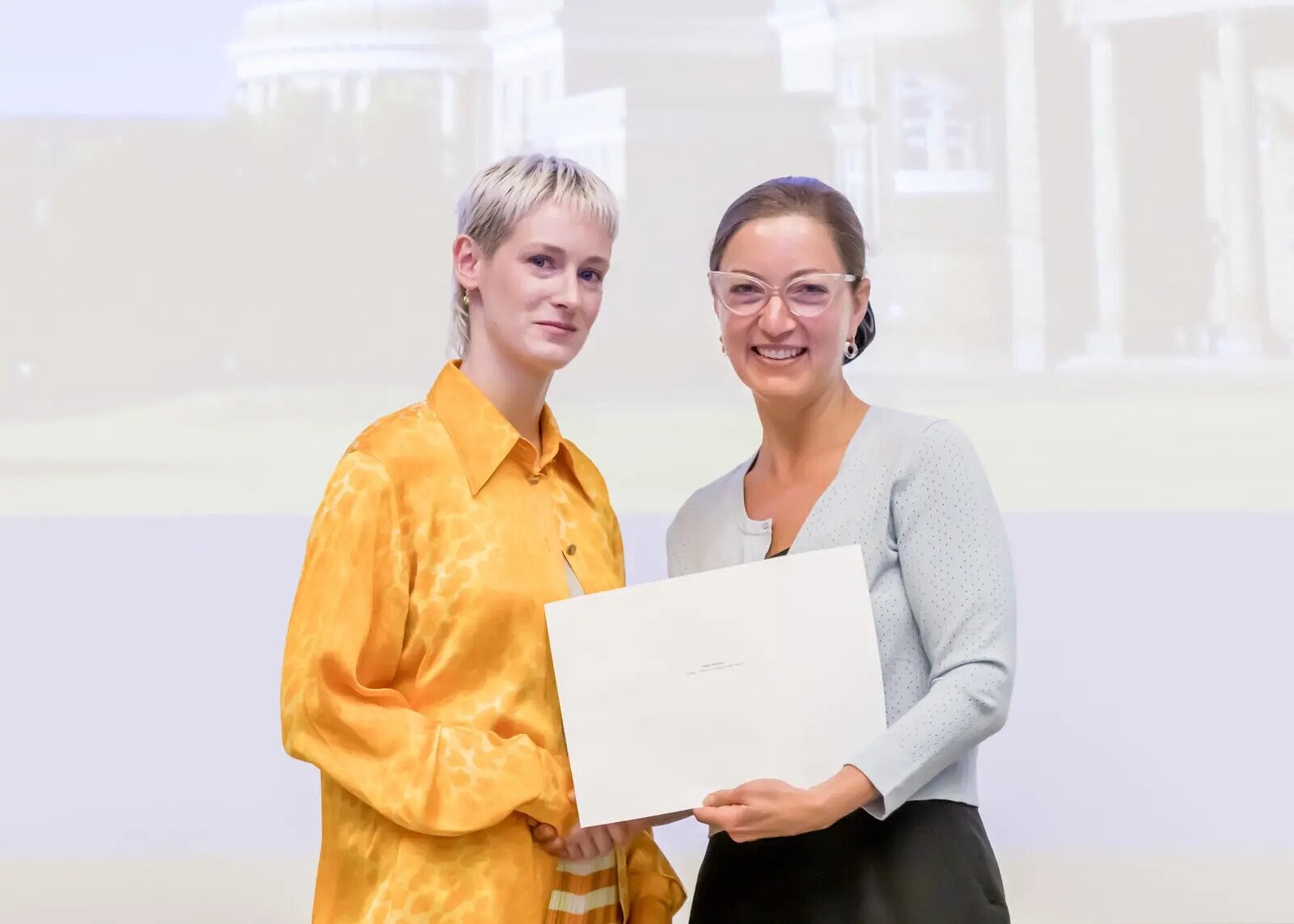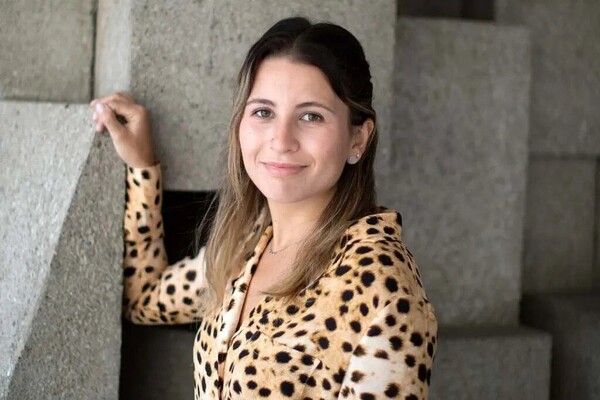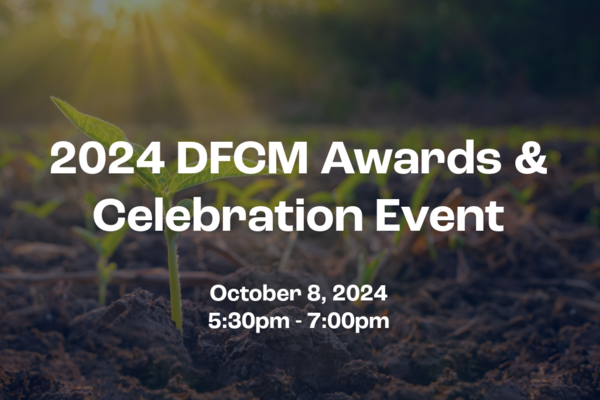New resident, Paige Homme, on the future of family medicine and why they are up for the challenge

This article was originally published as part of the Faces of Temerty Medicine series.
As Canada continues to face a shortage of family physicians, new resident doctors such as the University of Toronto’s Dr. Paige Homme are stepping up to the challenge.
Millions of Canadians don’t have a primary care provider. As of March, more than two million people in Ontario alone didn’t have a regular physician, up 24 per cent from March of 2020. And the Ontario College of Family Physicians predicts 20 per cent of Ontarians could be without a family doctor by 2025.
At the Temerty Faculty of Medicine’s spring convocation, Homme was the recipient of the 2023 Dr. Reg L. Perkin Undergraduate Award, which recognizes demonstrated excellence in family medicine and community medicine, significant contributions to volunteering, community activism, arts, music or sport as well an intent to specialize in the program.
Homme, who uses the pronouns they/them/theirs, spoke with writer Erin Howe about their decision to pursue family medicine and why they’re hopeful about the future of this profession.
What drew you to family medicine?
There are many reasons this specialty resonated with me. But something that really stood out, more philosophically than anything else, was that around the end of clerkship I read a lot of work by Zena Sharman, around queer and trans experiences in health care.
Her recent book, The Care We Dream Of, explores the idea of care that welcomes the whole person. Though it specifically focuses on queer and trans people, the concepts could be expanded to anybody. Family medicine is where this could be — and is — realized.
There's space to connect with patients, communities and larger systems. The idea of having a connection with someone and understanding them over time is special to family medicine because it allows for that more transformational work to happen.
Family physicians have a tremendous workload. What gives you hope as you embark upon such a challenging specialty?
It's important to focus on the hope, because it's very easy to get caught up in all doom and gloom.
There are incredible people based in Ontario, like Professor Tara Kiran and others who lead on both the local and national levels. Another person who inspires me is Professor Tia Pham, who is now in British Columbia, practicing and leading high-level policy work.
What’s happening in BC also gives me a lot of hope. Even though it is still not great there, I love the changes the province has made to the family medicine structure including moving away from the fee-for-service model and adopting a new payment system that accounts for how many people a doctor sees in a day, how complex those patients’ needs are and how much time the doctor spends doing things like reviewing lab results, coordinating referrals and administrative tasks. That was pretty revolutionary.
What is it like to be headed into family medicine, when there are so many challenges facing that field?
To me, the challenges aren’t really new. The system has been squeezed for years. Now the issue is getting the attention it deserves. As we all know, COVID just knocked the peg right out from under us.
As a society, we value the role of the family physician, but we're not seeing the kind of support they need. For example, the last family health teams in Ontario were implemented more than ten years ago.
And I think that's why a lot of people are trepidatious about going into family medicine. And it worries me. I want to be the comprehensive physician that we so need. It will be challenging to navigate. Looking to others, coming together as a community, and in my experience, advocating for change can be a tool of resilience because if you're not trying, it's easy to feel hopeless.
It sounds like advocacy is important to you. How are you engaged in advocacy work?
Over the past three years I've been working with Health Providers Against Poverty, which has a broad mandate to eliminate poverty and reduce health inequities in Canada, with a focus on Toronto. This year, I am co-chair with Talveer Mandur, a fourth-year psychiatry resident. As an organization we collaborate with other groups, frontline community workers and people with lived experience of poverty.
It’s important to me to take action and connect with others in medicine who share similar values, which I think had a lot to do with the path that I chose to take. I'm also interested in inclusive care for gender non-conforming, trans and gender-queer folks and was invited to be part of a speaker panel for Unity Health Toronto to talk about some of the work I’m doing in that area.
Can you tell us a bit more about that work?
Gagan Singh, a first-year psychiatry resident at UBC, Galo Ginocchio and I developed the “ABCDs of gender inclusive care” framework with the support of Allison Needham, director of anti-racism, equity and social accountability at Unity Health Toronto. There are four main principles: assessment, basic ID, consistency and demonstration. We aim to inspire reflexivity, resist ‘static checklists’ and to encourage communities of practice. The framework is still in the early stages of development and implementation and it’s just one of many possible and urgently needed initiatives. I was born in the early 1990s and I remember when gay marriage was legalized in Canada in 2005. There has been such a trajectory towards acceptance in my lifetime, at least for a subsection of that [LGBTQIA+] population. But a lot of people are left out of these conversations, mainly folks with intersecting locations of identities, such as race or ethnicity, gender and class. Creating and maintaining inclusive safe spaces is very important to me.
Who has inspired you?
Before the pandemic, I went to a student-led conference on the invisible curriculum and boundaries within medicine through an anti-oppressive lens. Nanky Rai, who was a previous 2SLGBTQIA+ health education theme lead for the MD Program, was among the speakers and became a mentor. Professor Ritika Goel, the MD-PGME social justice, anti-oppression and advocacy theme lead, has also helped me imagine and shape the doctor I want to be.
Edward Xie, Vanessa Redditt and Samantha Green are also quite amazing family physicians. Michaela Beder and Saadia Sediqzadah in the department of psychiatry have also been very important people to me. There are so many people who I’ve met through advocacy work who have been fantastic mentors.
News



